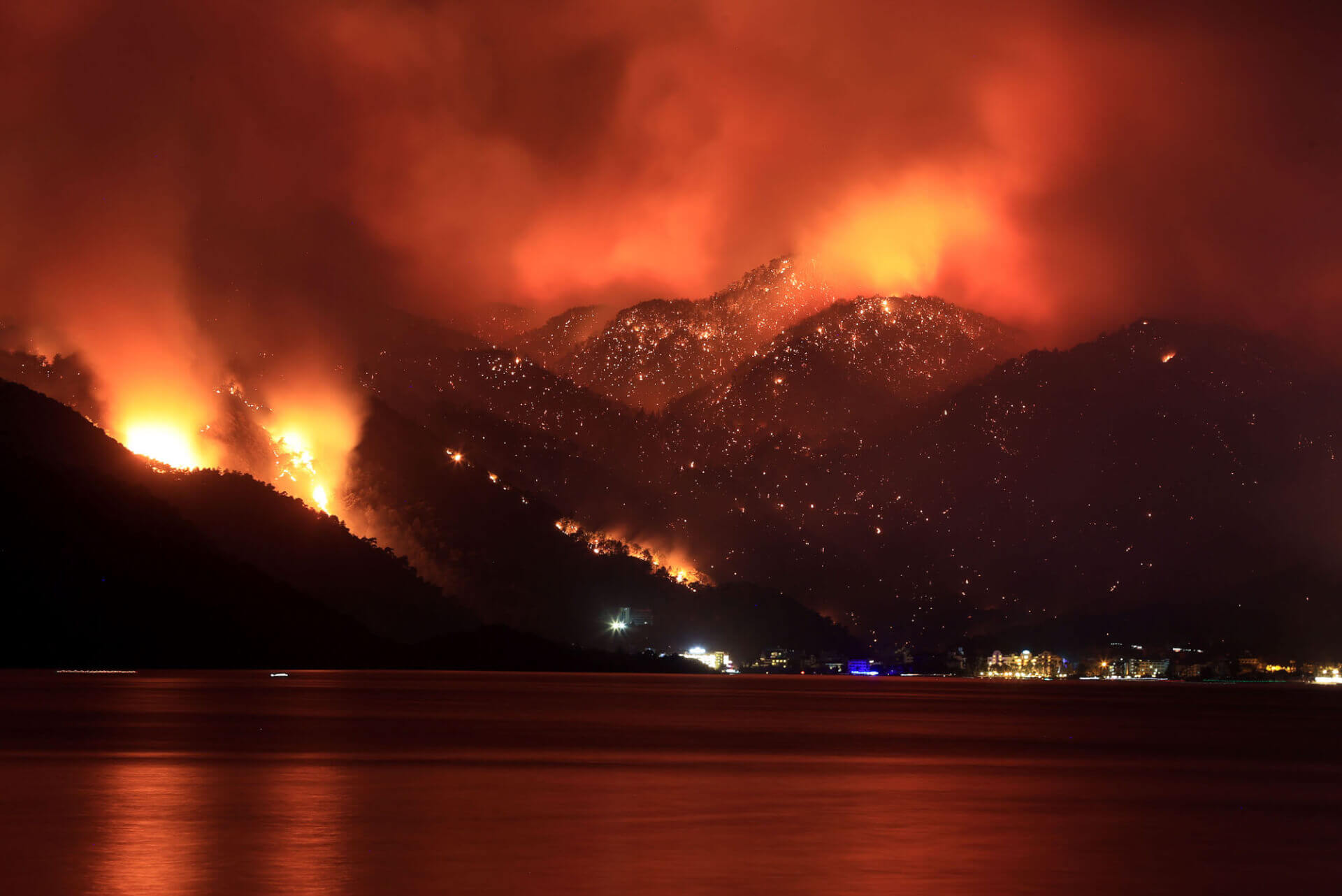Intense wildfires have hit the Mediterranean countries, including Turkey, Italy, and Greece, since late July, resulting in mass evacuations, loss of life, and livelihood. In addition, the prevailing heatwaves across the region invite a high risk of more fires and smoke.
Scientists say that human-induced climate change is increasing the possibility of heat waves. Concerning this, the European Union’s (EU) Copernicus Atmosphere Monitoring Service (CAMS) said, “The hot and dry conditions had hiked the danger of further fires, although high temperatures alone do not trigger wildfires; because they need a source of ignition.” CAMS uses satellites and ground-based observations to monitor the wildfires. A senior scientist with CAMS said, “It is especially important to closely watch these high-intensity fires as the smoke they emit can have impacts on air quality locally and downwind.”
Turkey
As per news reports, firefighters were busy dousing 16 wildfires across Turkey, including near the coal power station, on Wednesday. However, Fahrettin Altun, Turkey’s Communication Director, said, “The main units of the power station were not seriously damaged according to the initial examination following the evacuation of the facility.”
Hindustan Times quoted Turkey’s Minister for Agriculture and Forestry, Bekir Pakdemirli, saying, “In the past eight days, 167 fires have been brought under control.” In addition, wildfires on the southern coast have killed at least eight people and forced others to flee.
Fire radiative power, a key metric of fire intensity that measures energy produced from the burning of trees and matter, reached the highest daily values since data records began in 2003. CAMS said the smoke surrounding southern Turkey was visible in satellite images, and that the intense fires have caused “high levels of particulate matter pollution over the Eastern Mediterranean area.”
Italy
It has been weeks since fires have been raging across Italy, with tens of thousands of hectares of forest lost in the central and southern regions. Botanists in Sardinia are alarmed over the destruction of local biodiversity due to the fires. In addition, around 150 people were evacuated via sea, and the airport was closed for hours when the wildfires reached Catania, Sicily.
Italy is reportedly struggling to control the fires due to a combination of “political responsibilities, forest protection bureaucracy and alleged criminal activity.” Consequently, a state of emergency was declared in Sardinia last week due to a series of fires that hit the western coast. On Sunday, Italian Prime Minister Mario Draghi declared the “state of national mobilisation of the civil protection system so that personnel and volunteers can be sent to Sicily.”
Greece
On Wednesday, Greece recorded above 46 degrees celsius temperature, escalating the possibility of fires across the region due to intense heatwave. The fire crews across Greece struggled to control fresh fire amid the heatwave, including the one near Olympia, the birthplace of the ancient Olympic games.
Thousands of people were forced to flee on Tuesday as the fire spread through the north of Athens, decimating homes and settlements. Experts say that the fires have been fueled by constant drought and high temperatures. Consequently, the government announced hotel accommodation for locals who were unable to return home. However, no deaths or severe injuries were reported due to the Greek wildfires.
In the middle of a record heatwave, the National Observatory of Athens requested people to remain indoors, preferably with windows closed, as the fires have worsened Athens’ atmospheric pollution.
EU Response
On Wednesday, European Commissioner for Crisis Management Janez Lenarčič said, “Firefighting resources from the EU nations are on their way to Greece, Italy, Albania and Northern Macedonia to help fight forest blazes. We are working around the clock to send help as fires rage across Europe.” Lenarčič added, “I thank Cyprus, Czechia, France, Slovenia and the Netherlands for swiftly deploying firefighting aeroplanes, helicopters and a team of firefighters to support countries heavily affected by forest fires.”
OVERVIEW: Fires Across the Mediterranean
Wildfires are rapidly spreading across the Mediterranean, including Turkey, Italy, and Greece.
August 5, 2021

SOURCE: THE ATLANTIC
